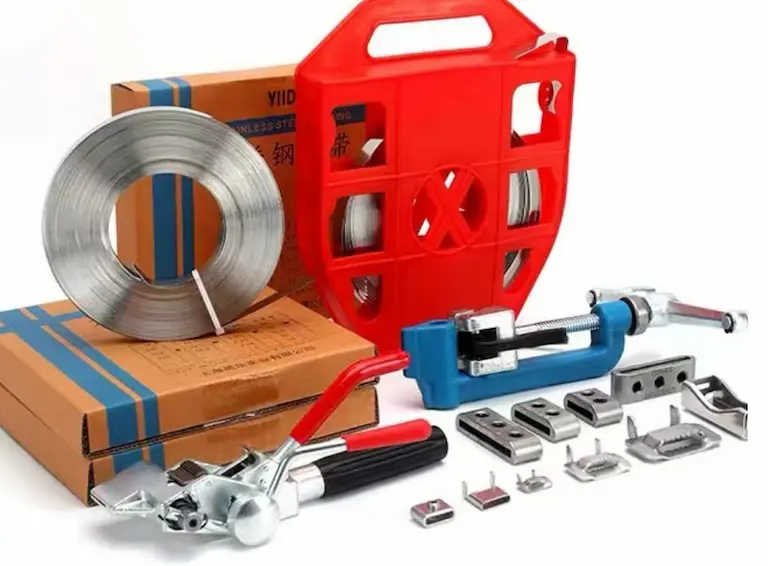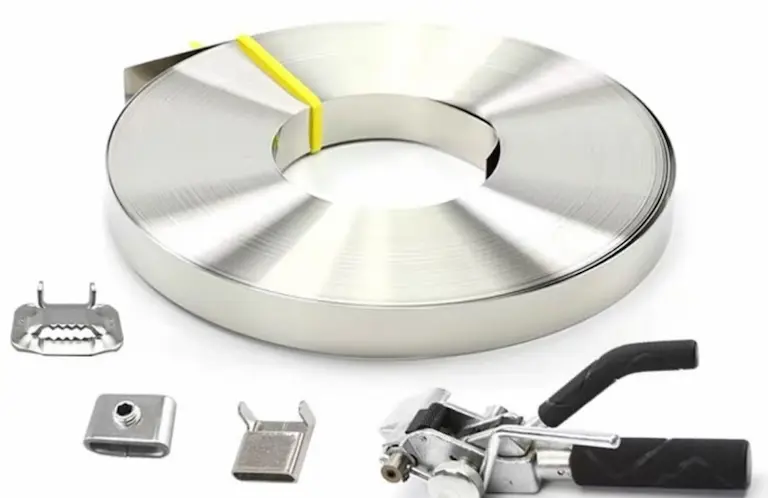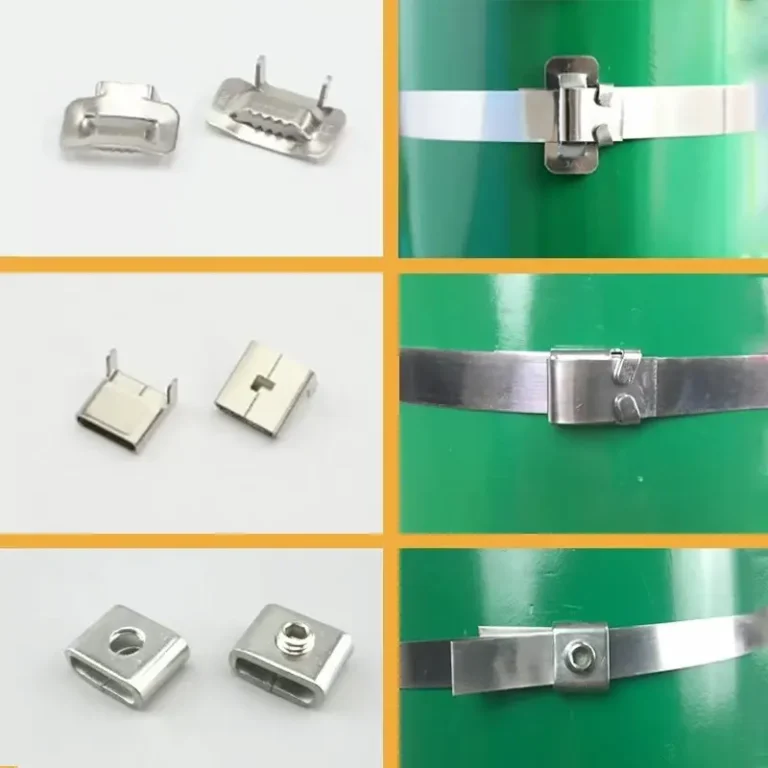Stainless Steel Cable Ties, Types, Strength, Features

Ewan Liao

Stainless steel is an in-demand product due to its corrosion-resistant feature that regular carbon steel lacks. With this, you can expect any structure or setup to have great resistance against various elements. Stainless steel cable ties (ss cable ties) are one of the materials arising out of this product.
Stainless Steel Cable Ties are robust fastening devices designed for securing cables, wires, and various components in demanding environments. Made from premium stainless steel, they offer exceptional strength, durability, and resistance to corrosion, making them ideal for applications where plastic ties fail to perform.
Material Testing After You Place An Stainless Steel Foil Order
Hardness Testing
Ingredient detection
Tensile Strength Test
Table of Contents
What Is the Stainless Steel Cable Tie?
A Stainless Steel Cable Tie is a type of fastener used to hold items together, primarily electrical cables or wires. Unlike traditional plastic ties, these are made from stainless steel, providing enhanced strength and longevity. They are commonly used in industries like aerospace, maritime, and construction where environmental conditions can degrade plastic ties.
Stainless Steel Cable Ties are designed to withstand extreme temperatures, UV radiation, and corrosive substances. They are available in various grades of stainless steel, such as 304 and 316, each offering different levels of corrosion resistance. These ties are essential in applications where failure is not an option.
Stainless Steel Cable Tie: Strength
The strength of Stainless Steel Cable Ties surpasses that of their plastic counterparts. They can handle heavier loads and are less likely to break under tension. According to a study published in the Journal of Materials Engineering, stainless steel ties maintain structural integrity even under continuous mechanical stress1.
Stainless Steel Cable Tie: Features
- High Tensile Strength: Capable of securing heavy bundles.
- Corrosion Resistance: Ideal for harsh environments.
- Temperature Tolerance: Suitable for extreme heat or cold.
- Durability: Longer lifespan reduces the need for replacements.
- Non-Flammable: Does not support combustion.

Types of Stainless Steel Cable Ties
Uncoated Stainless Steel Zip Ties
These are basic stainless steel ties without any additional coatings, suitable for general purposes where coating is not necessary.
Coated Stainless Steel Tie Wraps
Coated ties have a protective layer, often of polyester or PVC, to prevent galvanic reactions and provide additional insulation.
Releasable Stainless Steel Wire Ties
These ties can be adjusted or removed after installation, offering flexibility for temporary applications.
Stainless Steel Cable Tie: Technical Parameters
- Material: Stainless Steel 304/316
- Width: Varies from 4.6mm to 12mm
- Length: Ranges from 100mm to 1500mm
- Operating Temperature: -80°C to +538°C
- Minimum Tensile Strength: Up to 255 lbs depending on size
Stainless Steel Cable Tie: Applications

Stainless Steel Cable Ties are used in:
- Marine and Offshore: Resisting saltwater corrosion.
- Aerospace: Withstanding extreme temperatures and vibrations.
- Industrial Settings: Securing heavy cables and equipment.
- Transportation: Bundling wires in vehicles exposed to varying climates.
- Construction: Fastening components where fire resistance is crucial.
Are Stainless Steel Cable Tie and Plastic Cable Tie Interchangeable?
While both types serve the primary function of bundling cables, they are not entirely interchangeable. Stainless Steel Cable Ties offer superior strength and resistance to environmental factors, making them suitable for demanding applications. Plastic ties, like ss cable ties, are more appropriate for lighter, less demanding tasks. Choosing between them depends on the specific requirements of the application.
Why Is Stainless Steel Cable Tie Expensive?
In comparison to other types of cable ties, stainless steel cable ties can be a bit costlier. However, within the same aspect, ss cable ties also are technically the most durable and long-lasting. Thus, these benefits can weigh out the initial costs of the materials.
Stainless steel cable tie outlasts every other cable tie in the market in terms of value and performance. Unlike polymer base ties, stainless steel ties withstand heat and chemicals. Additionally, it outperforms regular steel in terms of longevity and corrosion resistance.
Thus, you can expect this material to excel in these considerations and won’t require the hassle of frequent replacing.
What’s The Difference Between 304 And 316 SS Cable Ties?

Stainless steel has different grades formulated to perform differently upon an application’s needs. Their base elemental composition varies minutely but enough to make a significant effect on performance. Among these dozens of grades of stainless steel, grades 304 and 316 are the most popular.
The market wants grades 304 and 316 for their versatility which covers a lot of industry demands. As a result, chances are that most of the stainless steel cable ties you’ll encounter are made of these. To determine what you’ll need between the two, we’ve enlisted key factors to consider.
Grade 304 SS Cable Ties
Grade 304 is typically the standard market issue of stainless steel. Its property covers a lot of non-demanding applications. Thus, it is often referred to as a “general-use” stainless steel. This grade does the job if you need a stainless steel cable tie for average conditions without high corrosion risks.
Try for free 304 Stainless Steel Pipe: Classification, Types and Applications
Grade 316 Stainless Steel Cable Ties
Meanwhile, Grade 316 performs better for corrosion resistance. Its 2-3% molybdenum content boosts this said property. The common use of this grade includes marine or high chlorine environment applications. Thus, it is referred to as “marine-grade” steel.
Grade 316 is perfect if you need steel ties for weather-exposed use. Other usages include, of course, the aforementioned marine applications, mostly as a component binder for sea vessels or equipment. However, this upgraded performance comes at a cost as grade 316 is more expensive than 304.
What Is the Best Grade for SS Cable Ties?
The best grade actually depends on where you are planning to use it. The same reasoning factors in for every other grade stainless steel has. After all, grades are made to perform their best in their respective niches.
In grade 304’s case, it is recommended for non-extensive exposure to deteriorating mediums. These deteriorating mediums include marine or coastal use, harsh weathering conditions, chemical exposures and the like.
In some aspects, depending upon the scale and length of exposure, 304 can still be a viable option. However, for long-term extensive exposure, there might be other grades like 316 which will perform superior.
Read more about 304 Stainless Steel Sheet: Technicalities, Features and Applications
Does Stainless Steel Cable Tie Rust?
Yes. Stainless steel cable ties can rust. They are technically rust-resistant, not rust-proof. However, under normal circumstances, you can expect this unlikely to happen.
The worst-case scenarios which can induce rusting involve wrong application and neglect. As we’ve mentioned, different grades have different tolerances. For example, you may have used a grade 304 for marine applications wherein the conditions surpass its resistance thresholds. Thus, you can expect it to deteriorate faster in such conditions.
Other cases may involve neglect like abrasion or harmful chemical exposures. Although brief instances cannot do much damage, the case is different for long-term cases.
Thus, it is still advisable to conduct a regular inspection or maintenance. Preventing early stages of deterioration will help prolong the lifespan of your ss cable ties. Ultimately, it saves you the trouble of untimely repairs and expenses.
How to Check the Quality of Your Stainless Steel Cable Tie?
Simple tools as they can be, cable ties can become a source of a dilemma if taken for granted. There is more than just the function of tying or bundling components. The make, mechanism, and coating are among the considerations to check a quality stainless steel cable tie:
1. The Make or Physical Properties
This is your primary consideration if you want to check the capacity of your cable ties. This includes the strength thresholds, grade, and dimensions of your stainless steel cable ties.
Another thing to check is whether there are signs of rusting and deformation. Such are symptoms of poor quality or mishandling of the product. Thus, having those conditions can have an adverse effect on the performance of your ss cable ties.
2. Mechanism
This pertains to the locking or strapping mechanism of the cable tie. You might be wondering why this might sound so important, given the function is simply just to lock? Well, this is one crucial factor to consider since they can become the ‘loose ends’ if mishandled.
Furthermore, there are different locking mechanisms to suit conditions like vibrations, heat exposure, and others. These conditions offer different challenges on how your cable ties will grip. Thus, it is of utmost importance to choose what fits the use.
For example, areas with regular vibrations can loosen a standard self-locking design. Therefore, a slotted type of locking mechanism might be more suitable for this case. Another example includes the risk of thermal shrinkage and expansion in a high heat environment. Similarly, you’ll want a locking mechanism that can adapt to this scenario.
3. Coating
Stainless steel cable ties are formidable materials just by themselves. Sometimes, however, a supplementary coating can help preserve the materials. A good protective layer is always welcome if it helps prolong the function of the material. Furthermore, specialized coatings like UV protective coatings or non-toxic coatings provide specific support for the steel.
These are basic factors that need checking for ss cable ties. Manufacturers can provide a variety of designs that answer unique requirements. Thus, it is always imperative to check the quality of the products offered and their specifications.
Now, if you’re looking for high-quality stainless steel products, better start with Yaoyi. Having around 25 years of trusted industry reputation, we ensure you can never go wrong with the products we manufacture. Visit our website and a wide array of quality stainless steel products made for you.
